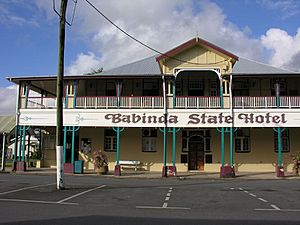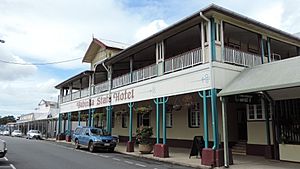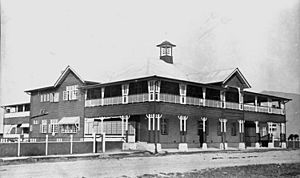Babinda State Hotel facts for kids
Quick facts for kids Babinda State Hotel |
|
|---|---|

Babinda State Hotel, 2009
|
|
| Location | 65-85 Munro Street, Babinda, Cairns Region, Queensland, Australia |
| Design period | 1914 - 1919 (World War I) |
| Built | 1916 - 1917 |
| Architect | Department of Public Works (Queensland) |
| Official name: Babinda Hotel | |
| Type | state heritage (built) |
| Designated | 22 February 2002 |
| Reference no. | 602189 |
| Significant period | 1910s (fabric) 1910s-1930s (historical) |
| Significant components | cellar |
| Builders | Day labour |
| Lua error in Module:Location_map at line 420: attempt to index field 'wikibase' (a nil value). | |
The Babinda State Hotel is a special old hotel located at 65-85 Munro Street in Babinda, Queensland, Australia. It was designed by the Department of Public Works (Queensland) and built between 1916 and 1917. It's also known as the Babinda Hotel. This building is so important that it was added to the Queensland Heritage Register on 22 February 2002.
Contents
Discover the Babinda State Hotel
A Special Hotel's Story
The Queensland Government built the Babinda State Hotel in Babinda between 1916 and 1917. This hotel was unique because it was the only one built and run by the Queensland Government at that time. It was part of a plan by the Labor Government to have the government run businesses.
How Babinda Grew
The town of Babinda started around 1912. It was a small place with about 100 people. The area was mostly used for growing sugar. Between 1914 and 1915, more people moved to Babinda. This was because the Babinda Central Sugar Mill was being built.
In 1915, the town was planned out for future growth. People bought land and started building homes and shops. Soon, government services like a post office and a school were also set up.
Why the Government Built a Hotel
Around 1915, the Labor Government, led by T. J. Ryan, started state-run businesses. This was to help people get basic goods at fair prices. They started butcher shops, farms, and sawmills. Most of these businesses lost money. But there was one big success: the State Hotel at Babinda.
A law about sugar factories in 1911 had stopped the sale of alcohol in sugar-growing areas. This meant Babinda had no places for people to stay. It was thought that this lack of good places to stay might stop skilled workers from coming to the sugar factory. To fix this, the Queensland Government built the Babinda State Hotel. Since the government ran it, the hotel was allowed to sell alcohol.
Opening and Early Days
The hotel was designed by government architects and built by local workers. It opened in May 1917. It was a modern, two-story building made of concrete and wood. It had 58 bedrooms, with different sections for first-class and second-class guests. People said it was "splendidly furnished" and had one of the biggest bars in Queensland.
The new State Hotel was meant to be a showpiece. It became the main social spot in Babinda. Important visitors, including Australian Prime Ministers Billy Hughes and Stanley Bruce, were welcomed there.
The hotel was first run by the Home Department. Later, its management moved to the State Trade Office. Unlike most other government businesses, the State Hotel actually made money.
Selling the Hotel
From 1929, a time of economic hardship called the Great Depression began. Many government businesses were losing a lot of money. The new government decided to sell off all these state-run businesses.
The sale of the Babinda State Hotel was announced in 1929. To attract buyers, the government offered the new owner the only hotel business in town until 1935. It was also a rule that the new owner had to remove the word "State" from the hotel's name.
Local people in Babinda did not want the hotel to be sold. But the sale went ahead. The hotel was put up for auction in March 1930. A man named Mr J.A. O'Hagan bought it for £50,000. After the sale, the hotel was renamed the Babinda Hotel.
Mr O'Hagan continued to run the hotel in a grand way. But during the Second World War, business slowed down. He sold the hotel in 1941. Since then, the hotel has had many owners but has always stayed open. Some parts of the hotel, like a second-class accommodation wing, were removed in 1970. It is still the only hotel in Babinda and is a very important building in the town's centre.
What the Hotel Looks Like Today
The Babinda Hotel is on Munro Street. It stands out in the town's main street. It is a two-story building made of timber, with a corrugated iron roof. The front of the building has open verandahs with many timber posts.
In the middle of the building, there is a pointed roof section called a pediment. This marks the main entrance. Two timber doors with special leadlight windows that say "BSH" (Babinda State Hotel) lead into the hotel. There are also casement windows on either side of the entrance.
On the ground floor, you'll find two bars, a dining room, kitchen, and other rooms like a games room and a cellar. The second floor has rooms for guests. These rooms open onto a wide verandah that looks over Munro Street. There's also a private living area and an inside verandah.
The guest rooms on the second floor have fancy timber archways in the hallway. Double French doors open onto the verandah. In the main bar downstairs, you can see steel beams on the ceiling. These beams were once used to move beer kegs from the storeroom to the bar. The western bar has a special silky oak archway. The lower parts of the walls in the main entrance and western bar are also made of silky oak.
Behind the hotel, there is a concrete slab. This is where the old stable floors used to be. A decorative roof vent was taken off the hotel in the 1980s.
Why It's a Heritage Treasure
The Babinda Hotel was listed on the Queensland Heritage Register on 22 February 2002. This means it's a very important historical place.
- It shows how Queensland's history changed: The hotel was built in 1917. It shows an important part of Queensland's history in the early 1900s. It also shows how Babinda grew as a sugar town. The hotel is proof of a time when the Labor Government tried to run businesses to compete with private companies.
- It's a rare part of Queensland's history: This State Hotel was the only one built and run by the Queensland Government. It was one of only two "state" hotels known in all of Australia. This makes it very special and rare.
- It shows what country hotels were like: The way the State Hotel was built and what it offered shows how country hotels looked and worked in the early 1900s.



